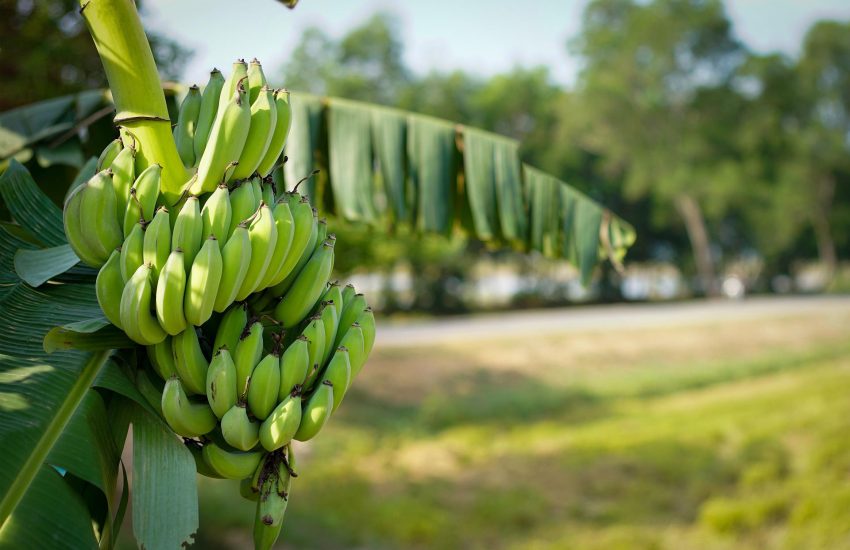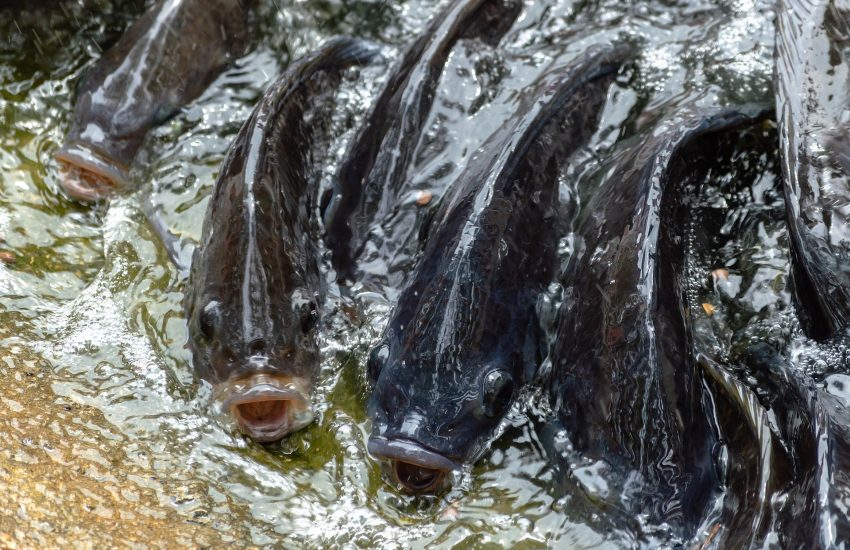What Can Ducks Eat: A Comprehensive Guide to Feeding Ducks
Understanding Duck Diets
Ducks are omnivorous waterfowl species that can eat a variety of foods. Understanding their natural diet is essential to ensure that they receive proper nutrition. A balanced diet is vital for ducks to maintain good health, strong immune systems, and productive egg-laying.
Natural Diet
Ducks in the wild have a diverse diet that includes plants, insects, and small animals. They feed on aquatic plants such as duckweed, algae, and water lilies. They also consume seeds, grains, and fruits that fall into the water. Insects and small animals such as snails, worms, and fish make up a small portion of their diet.
Domestic Diet
Domestic ducks can be fed a diet that mimics their natural diet. A good quality commercial feed that contains grains, seeds, and vitamins can provide the necessary nutrition. Fresh vegetables such as lettuce, spinach, and carrots can also be added to their diet. It is important to avoid feeding ducks with bread, as it can cause digestive problems and malnutrition.
Nutritional Requirements
Ducks require a balanced diet that provides them with the necessary nutrients. Proteins are essential for growth, egg-laying, and feather development. Carbohydrates provide energy, while fats are necessary for insulation and energy storage. Vitamins and minerals are also essential for overall health.
Conclusion
In conclusion, understanding duck diets is crucial for their health and well-being. A balanced diet that includes a variety of foods can provide the necessary nutrition for ducks. By providing them with the right diet, owners can ensure that their ducks remain healthy and productive.
Safe Foods for Ducks
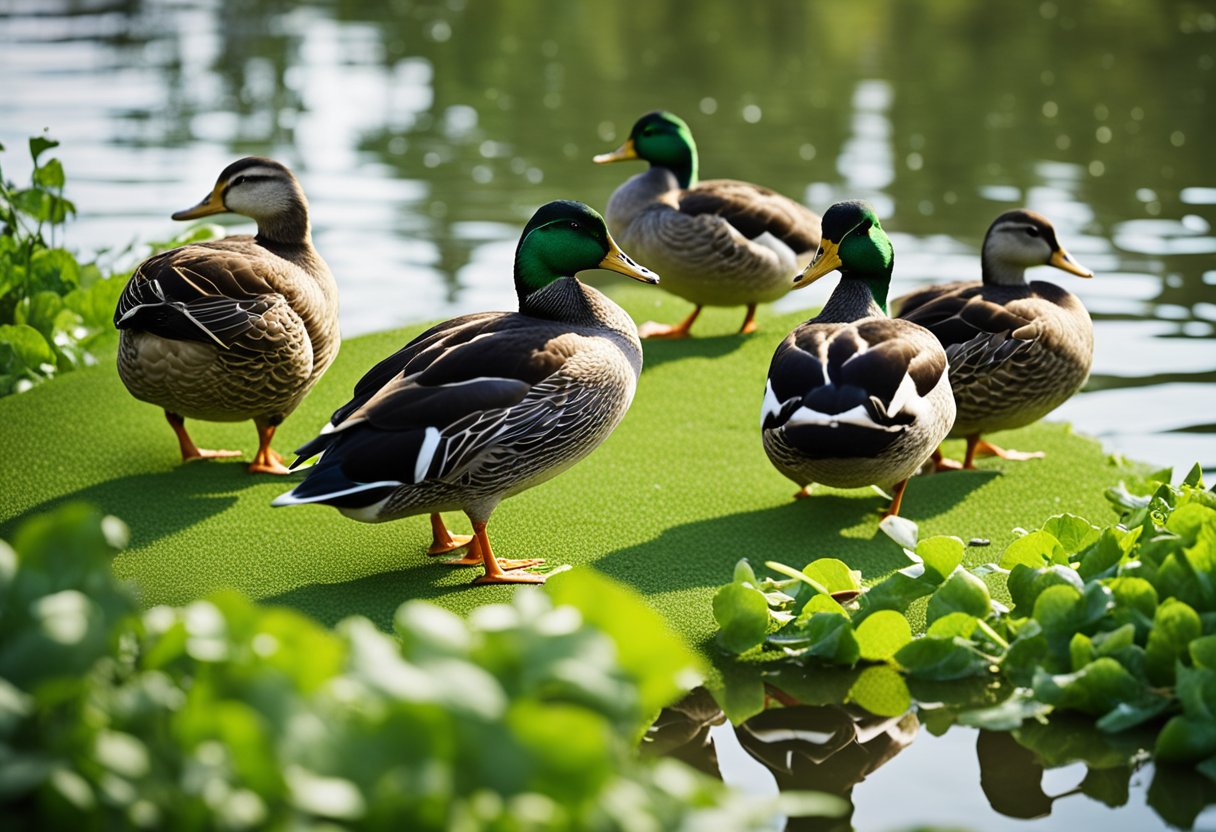
Feeding ducks can be a fun and rewarding experience, but it’s important to know what foods are safe for them to eat. Providing a balanced diet that includes a variety of foods is essential to keep ducks healthy and happy.
Vegetables and Greens
Vegetables and greens are a great source of vitamins and minerals for ducks. Some safe options include:
It’s important to note that while vegetables are a great addition to a duck’s diet, they should not make up the majority of their meals. Too much lettuce, for example, can cause diarrhea in ducks.
Fruits and Berries
Fruits and berries are a tasty treat for ducks and can provide a good source of vitamins and antioxidants. Some safe options include:
It’s important to remove any seeds or pits from fruits before feeding them to ducks, as these can be a choking hazard.
Grains and Seeds
Grains and seeds are a good source of protein and carbohydrates for ducks. Some safe options include:
- Corn
- Oats
- Wheat
- Sunflower seeds
It’s important to avoid feeding ducks bread, as it has little nutritional value and can cause health problems in ducks if consumed in large quantities.
Protein Sources
Protein is essential for a duck’s growth and development. Some safe sources of protein include:
- Eggs (cooked)
- Fish (cooked)
- Insects
- Mealworms
It’s important to note that while protein is important, it should not make up the majority of a duck’s diet. Too much protein can cause health problems in ducks, such as gout.
Overall, providing a balanced diet that includes a variety of safe foods is key to keeping ducks healthy and happy. Additionally, it’s important to always provide fresh water for ducks to drink and swim in.
Foods to Avoid
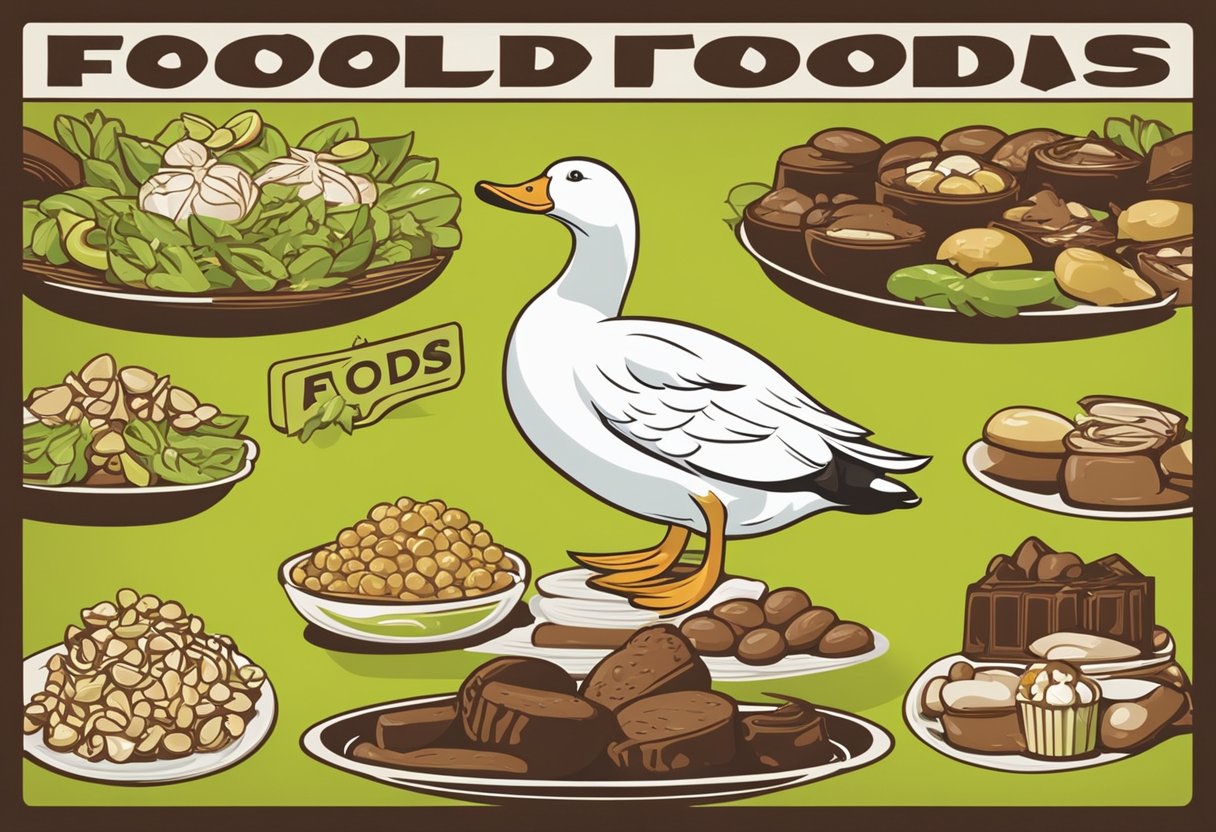
Ducks are known for their love of food, but not all foods are safe for them to eat. In fact, some foods can be harmful or even fatal to ducks. It is important for duck owners to be aware of these foods and avoid feeding them to their feathered friends.
Unhealthy Treats
While it may be tempting to give your ducks a treat every now and then, some treats can be unhealthy for them. Bread, crackers, and popcorn are popular treats that many people feed to ducks, but these foods are high in carbohydrates and can lead to obesity and other health problems.
Toxic Foods
Certain foods are toxic to ducks and should be avoided at all costs. Chocolate is one such food, as it contains theobromine, which can be toxic to ducks. Onions and citrus fruits are also toxic to ducks and can cause illness or even death.
Another condition that can affect ducks is called “angel wing,” which is a deformity that affects the wings of young ducks. This condition is caused by a diet that is too high in protein and can be worsened by feeding ducks bread or other unhealthy treats.
In general, it is best to stick to a diet of duck feed and fresh vegetables for your ducks. If you want to give them a treat, opt for something like peas or corn, which are healthy and safe for ducks to eat in moderation. By being mindful of what you feed your ducks, you can help keep them healthy and happy for years to come.
Feeding Practices
When it comes to feeding ducks, it is important to provide them with a balanced diet that meets their nutritional needs. Ducks can eat a variety of foods, including commercial duck feed, forage, and treats. However, it is important to keep in mind that not all foods are safe for ducks to eat.
Feeding Ducklings
Ducklings require a special diet that is high in protein and niacin. A good option for feeding ducklings is chick starter, which is a specially formulated feed that contains the necessary nutrients for their growth and development. It is important to provide ducklings with access to fresh water at all times, as they need to drink frequently to stay hydrated.
Feeding Adult Ducks
Adult ducks have different nutritional requirements than ducklings, and their diet should be adjusted accordingly. A good option for feeding adult ducks is layer feed, which is a balanced feed that contains all the necessary nutrients for laying hens. It is important to provide adult ducks with access to grit, which helps them digest their food properly.
When feeding ducks, it is important to avoid giving them foods that are high in salt, sugar, or fat. Additionally, it is important to avoid feeding ducks foods that are toxic to them, such as chocolate, avocado, and onions.
Overall, providing ducks with a balanced diet that meets their nutritional needs is essential for their health and well-being. By following these feeding practices, duck owners can ensure that their ducks are happy and healthy.
Natural Foraging
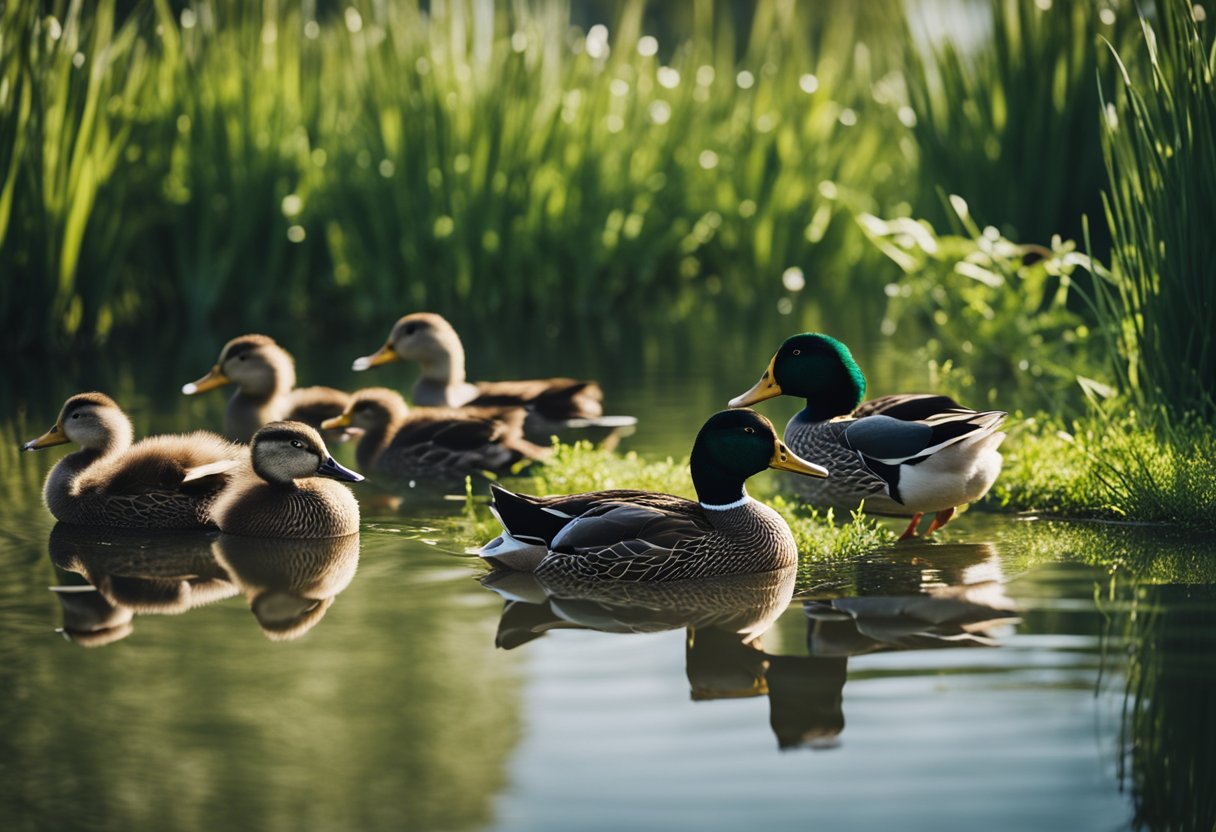
Wild ducks and geese have a natural diet that consists of a variety of foods they forage for in their natural habitats. Domestic ducks can also benefit from natural foraging, as it provides them with a range of nutrients they may not get from commercial feed.
Aquatic Plants and Animals
Aquatic plants and animals are a significant part of a wild duck’s diet. Ducks and geese feed on algae, aquatic plants, snails, frogs, and shrimp found in ponds, lakes, and streams. They can also eat small fish and crustaceans.
Some of the common aquatic plants that ducks feed on include duckweed, pondweed, and water lilies. These plants are rich in vitamins and minerals, which are essential for the ducks’ health.
Land-Based Foraging
Ducks also forage for food on land. They feed on grass, plants, and bugs found in fields and meadows. Some ducks, like mallards, prefer to forage near water bodies.
Ducks can also eat grains, seeds, and fruits found in fields and gardens. However, it’s important to note that not all plants and fruits are safe for ducks to consume. Some plants, like avocado, can be toxic to ducks.
In conclusion, natural foraging is an essential part of a wild duck’s diet. Domestic ducks can also benefit from foraging, as it provides them with a range of nutrients they may not get from commercial feed. By foraging for aquatic plants and animals and land-based foods, ducks can maintain a healthy and balanced diet.
Supplemental Feeding
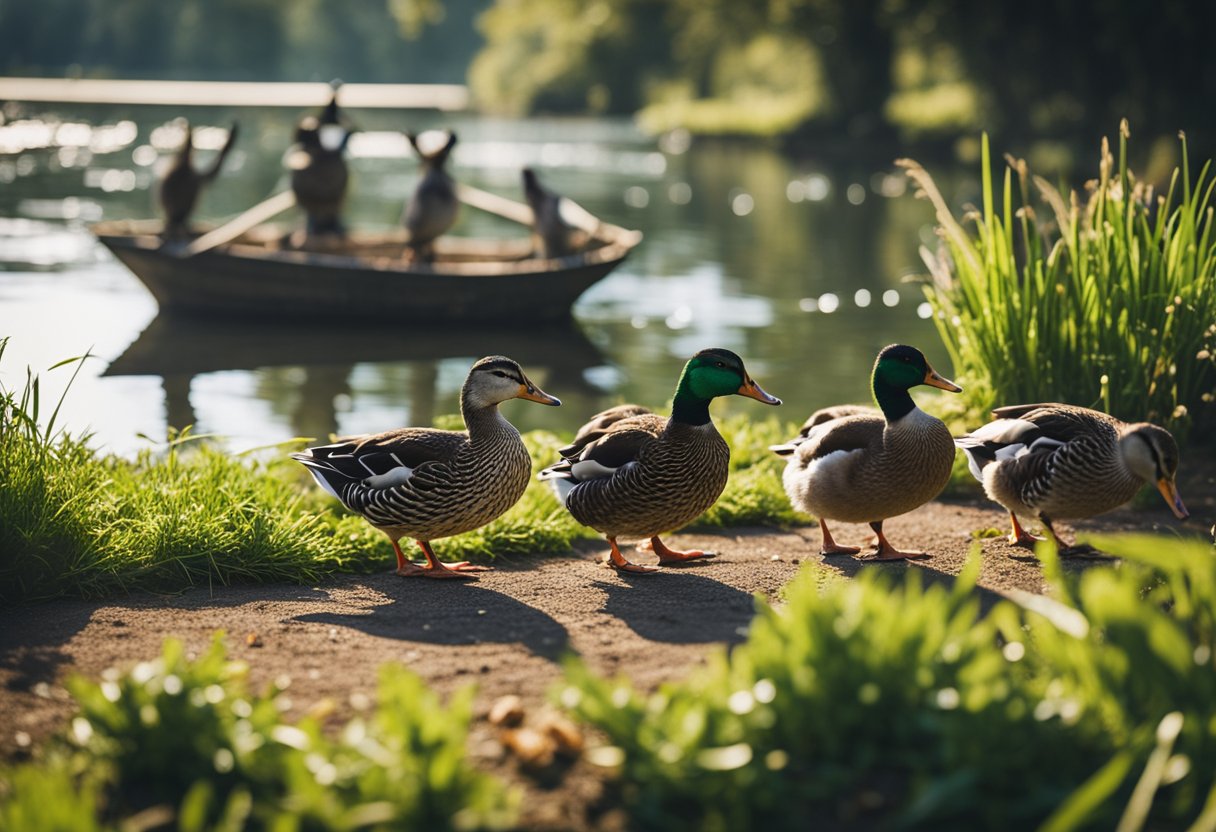
While ducks can find most of their food in their natural habitat, providing supplemental feeding can be beneficial for their health and well-being. Here are some options for supplemental feeding:
Duck Feed and Waterfowl Feed
Duck feed and waterfowl feed are specially formulated to meet the nutritional needs of ducks and other waterfowl. These feeds typically contain a balanced mix of grains, vitamins, and minerals. They are available in pellets or mash form and can be found at most feed stores. It is important to choose a feed that is appropriate for the age and size of your ducks.
Pellets
Pellets are another option for supplemental feeding. They are small, compressed pieces of feed that can be easily scattered on the ground or placed in a feeder. Pellets are available in a variety of formulations, including those that are specifically designed for ducks. They are a convenient way to provide additional nutrition to your ducks.
Grit
Grit is small stones or other hard materials that ducks use to grind up their food in their gizzard. Providing grit can help improve digestion and prevent health problems. Grit can be found at most feed stores and should be offered to ducks in a separate container.
Treats for Ducks
While ducks can eat a variety of foods, it is important to avoid feeding them foods that are high in sugar, salt, or fat. Good treats for ducks include fresh or frozen vegetables, such as peas, corn, and carrots, as well as small amounts of fruit, such as blueberries and watermelon. It is important to remember that treats should only be given in moderation and should not make up a significant portion of a duck’s diet.
In conclusion, supplemental feeding can be beneficial for the health and well-being of ducks. Duck feed, waterfowl feed, pellets, grit, and treats are all options for providing additional nutrition to your ducks. It is important to choose the right type of feed for your ducks and to offer treats in moderation.
Seasonal Considerations
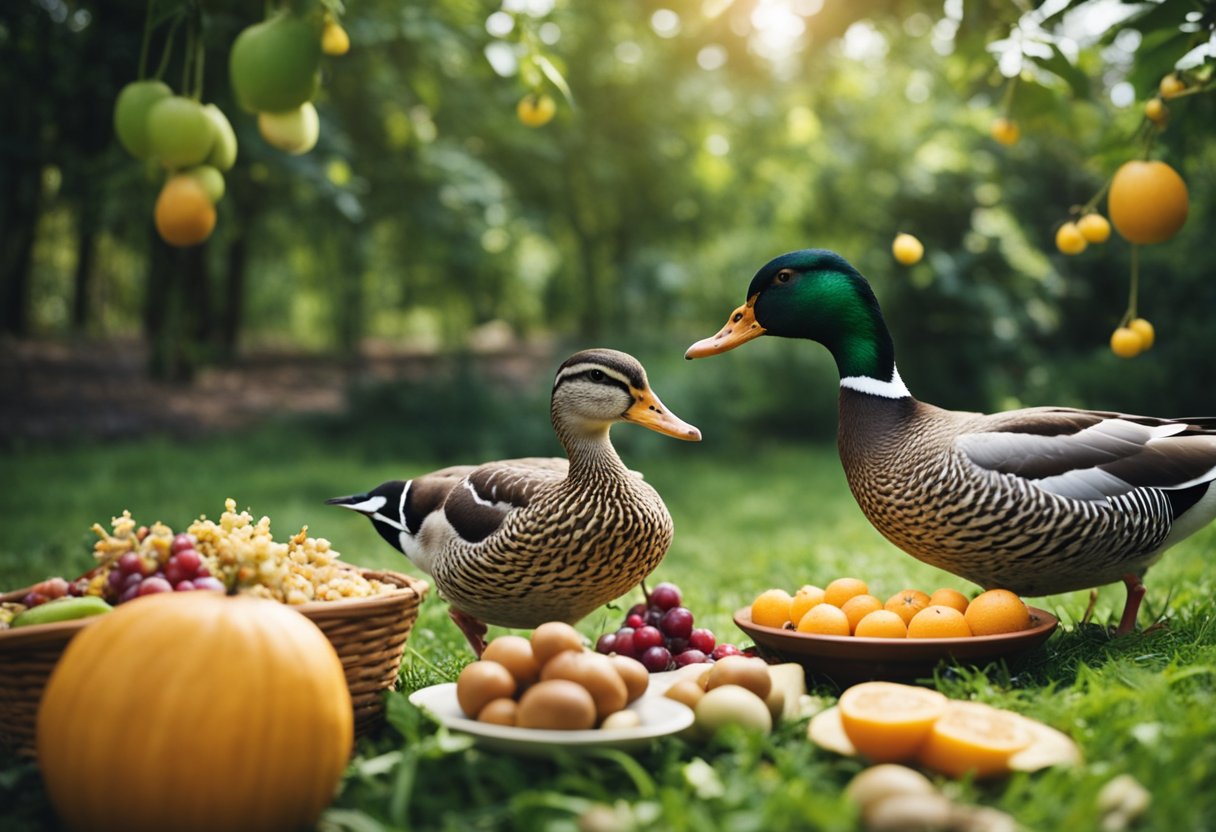
Spring and Summer Feeding
During the spring and summer months, ducks have access to a wide variety of food sources. As the weather warms up, insects become more abundant, providing an excellent source of protein for waterfowl. Ducks also enjoy grazing on vegetation such as grasses, clover, and dandelions.
If you have a flock of ducks, it is important to provide them with a balanced diet that includes both insects and vegetation. You can supplement their natural diet with commercial waterfowl feed, which contains essential vitamins and minerals that may be lacking in their natural diet.
Fall and Winter Feeding
As the weather cools down, insects become less abundant, and vegetation dies back, making it more challenging for ducks to find food. During the fall and winter months, cracked corn is an excellent food source for ducks. It is high in carbohydrates and provides the energy ducks need to stay warm during the colder months.
It is important to note that while cracked corn is a great supplement to a duck’s diet, it should not be the only food source provided. Ducks still need access to water and vegetation, even during the winter months. Providing a balanced diet will help ensure that your ducks stay healthy throughout the year.
Health and Nutrition
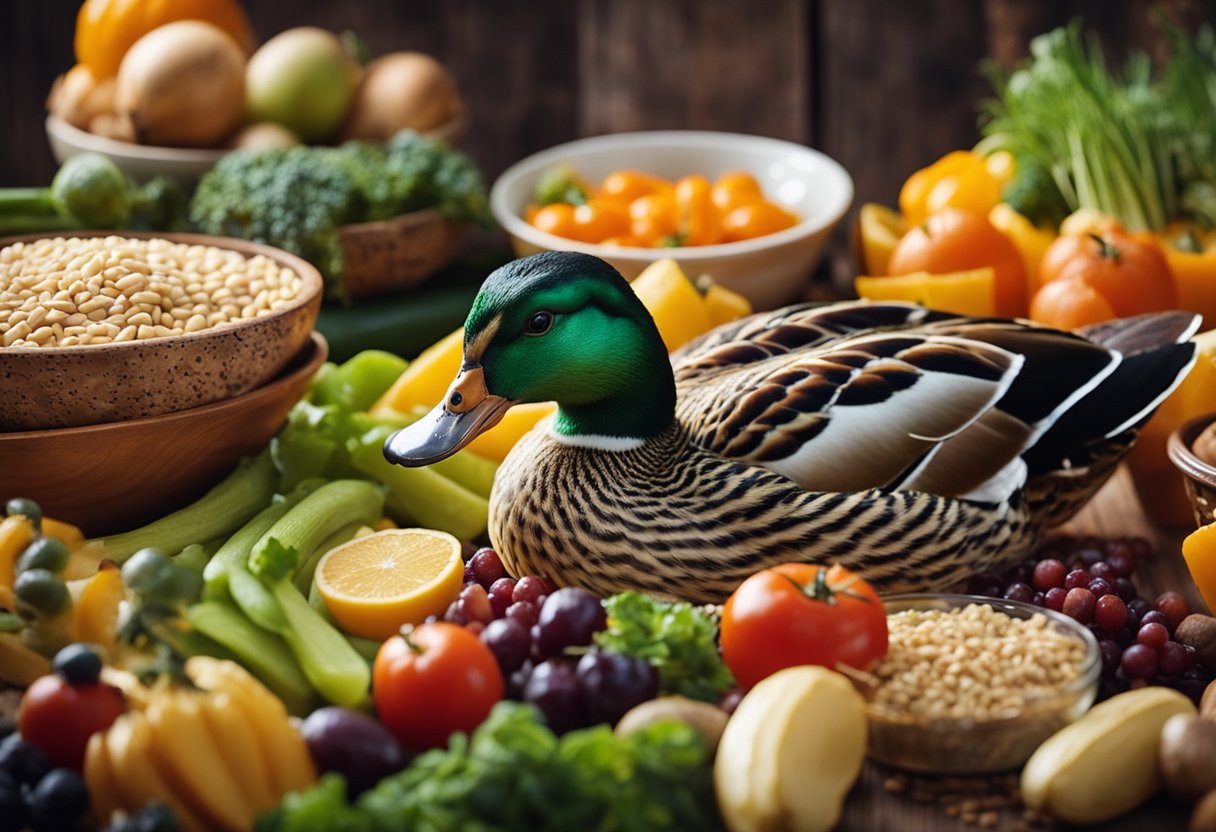
Ducks are omnivorous birds, which means they can eat both plant-based and animal-based foods. A balanced diet is essential for their health and well-being. Malnourished ducks are more prone to diseases and infections.
Vitamins and minerals are crucial for a duck’s growth and development. Ducks need a variety of vitamins such as Vitamin A, Vitamin D, and Vitamin E. These vitamins help to maintain healthy skin, feathers, and bones. Minerals such as Calcium, Iron, and Niacin are also important for their overall health.
Calcium is essential for bone development and egg-laying in female ducks. Calcium-rich foods such as oyster shells, crushed eggshells, and limestone grit should be provided to ducks regularly.
Niacin is a vital nutrient that helps ducks to maintain healthy skin, feathers, and nervous system. A lack of Niacin can cause a condition called “Black Tongue Disease,” which can lead to death. Foods rich in Niacin such as liver, fish, and grains should be included in their diet.
It is important to note that ducks should not be fed processed or salty foods, as these can be harmful to their health. A balanced diet that includes a variety of foods such as grains, vegetables, fruits, and insects is ideal for their health and nutrition.
Economic and Practical Aspects
When it comes to raising ducks, economic and practical aspects play a vital role in determining the feasibility of the venture. One of the most significant expenses in raising ducks is the cost of feed. However, ducks are efficient feed converters, and their diet can be supplemented with various food items that can be found on the farm or are readily available in the market.
Waterfowl feed is specifically formulated to meet the nutritional needs of ducks. It is readily available in the market and is sold in different forms such as pellets, crumbles, and mash. The cost of waterfowl feed varies depending on the brand, quality, and quantity. A 50-pound bag of waterfowl feed can cost anywhere from $20 to $30.
Ducks can also consume a variety of other food items, including grains, vegetables, and fruits. These food items can be sourced from the farm or purchased from the local market. Feeding ducks with these food items can help reduce the cost of feed and provide them with a more diverse diet.
Another practical aspect to consider when raising ducks is space. Ducks require adequate space to roam and forage. The amount of space required depends on the number of ducks being raised and the breed. For example, Pekin ducks require more space than Muscovy ducks. A general rule of thumb is to provide at least 4 square feet of space per duck.
In addition to space, ducks require access to water for drinking and bathing. A small pond or water trough can be used to provide ducks with water. However, it is essential to ensure that the water is clean and free of contaminants to prevent the ducks from getting sick.
In conclusion, raising ducks can be a practical and economically feasible venture. By supplementing their diet with various food items and providing them with adequate space and water, the cost of raising ducks can be minimized.
Frequently Asked Questions
What types of vegetables are safe for ducks to consume?
Ducks can eat a variety of vegetables, including leafy greens like spinach, kale, and lettuce. Other safe vegetables for ducks to consume include carrots, cucumbers, zucchini, and peas. It’s important to note that vegetables should be cut into small pieces to prevent choking.
What are healthy alternatives to feeding ducks bread?
While bread may be a common food to feed ducks, it is not the healthiest option. Instead, consider feeding them foods like cracked corn, oats, or birdseed. You can also provide them with fresh vegetables and fruits.
Is it safe for ducks to eat grains like oats and corn?
Yes, ducks can safely consume grains like oats and corn. These grains can provide ducks with essential nutrients and energy. However, it’s important to ensure that the grains are not moldy or contaminated.
Are fruits like apples and blueberries suitable for duck diets?
Yes, ducks can eat fruits like apples and blueberries. These fruits can provide ducks with important vitamins and minerals. However, it’s important to cut the fruits into small pieces to prevent choking.
Can ducks safely eat common bird seeds or chicken feed?
Yes, ducks can safely consume common bird seeds and chicken feed. However, it’s important to ensure that the feed is appropriate for ducks and does not contain any harmful additives.
Are there any vegetables known to be harmful to ducks?
While most vegetables are safe for ducks to consume, there are some that can be harmful. For example, members of the onion family can be toxic to ducks and should be avoided. Additionally, raw beans and rhubarb can be harmful and should not be fed to ducks.

